Introduction
From the very beginning of time, virtual meetings have been used as a way to exchange information, and it is clear that this method is not going anywhere anytime soon. In fact, according to the website Meeting Room Finder, in 2019 alone there are more than 10.6 billion meetings held per day. On top of this, according to TechRadar’s UK site, there are at least 32 million online webinars every month. With these numbers and others like them, it is no wonder that Virtual Presence Market Size (2019) was $22.13 billion! With the rise of AI-powered copywriting and websites, many people are wondering what the future holds for copywriters. Is the art of writing blogs and web content in jeopardy? What can we expect to see in the future?
What is a Webinar?
A webinar is a seminar or presentation given live, typically via the internet. It can also be described as a conference call that happens when more than one person are participating in an online chat on a website. They happen most often for the purpose of getting clients, customers, and other stakeholders to learn more about a product or service. Webinars have become so popular that they are being used by almost every organisation in the world today. Webinars are a form of ‘live’ multimedia communication that combines audio, video, and live or prerecorded presentations with interactive Q&A sessions and networking opportunities. They are most commonly used as a marketing tool to promote products, services, or events.
How to Host a Webinar
To host a webinar, the most important thing is to find the right software for your needs. There are many different platforms available, but the best one will depend on your budget and the type of webinar you want. You can also make some research about what types of webinars your audience is interested in so that you know what platform would be best for them. In order to host a webinar, you need software that is reliable, secure and user-friendly. This software will help you make all the necessary arrangements before your webinar. There are many types of software to choose from including webinar platform, online event booking platforms, turnkey event ticketing systems, live streaming platforms and more.
Best Practices for Webinars
In this article, the author lists the best practices for webinars. These practices are split into three groups: pre-webinar, during a webinar, and post-webinar. One practice is to set up your room and equipment beforehand. Another key practice is to know your audience. Finally, when hosting a webinar it is important to know what questions or challenges you will face during the event, so that you can prepare accordingly. Webinars provide a unique opportunity for businesses to connect with their audience. They provide the perfect way to offer services and get feedback from potential clients. This brings about a lot of different opportunities for businesses who want to reach more people, but it’s important to have guidance on how you should organize your webinar.
The Top 8 Webinar Software Platforms
The best webinar software platforms will be complete packages that offer all the tools needed for an effective online sales and marketing strategy. The most common features found in these software platforms will be: a customisable event scheduling tool, advanced reporting capabilities, chat rooms, a sales and marketing campaign management module, and video capture.
1. Demio
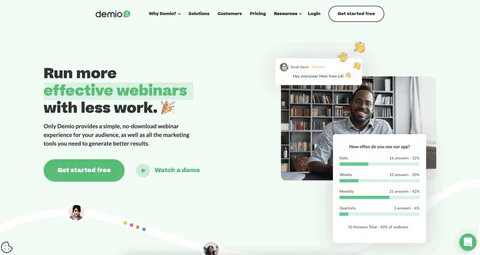
Demio, created by the company Global Visibility, is a booming business with over 700,000 users from 130 countries. It provides users with more than just the software to host a webinar; it also provides marketing services and guidance for those who are new to the world of online marketing. With the help of their marketing experts and digital marketing strategies, all small businesses can take advantage of Demio’s great features and service without spending a lot of money.
2. Livestorm
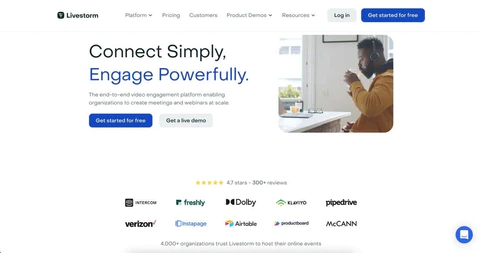
Livestorm is a webinar software platform that is used by organisations of all sizes to organize and conduct events. They have an easy interface for creating presentations, and their features are also designed to make it easier for users to share content with attendees. The platform also has built-in chat rooms so that attendees can ask questions or engage in discussions with one another. Livestorm is a webinar software platform that works with practically any device. This platform allows for video, audio and text collaboration to take place at the same time. It also offers an easy-to-use interface.
3. WebinarJam
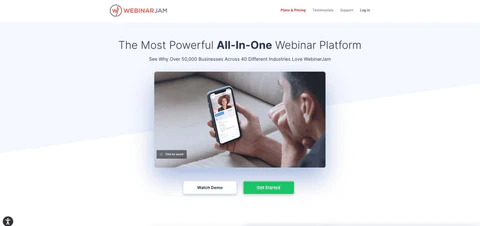
I have been searching for the best webinar software platforms of 2023. I have looked at many different providers, but none of them seem to compare to WebinarJam. WebinarJam is a company that creates simple and easy-to-use webinars for individuals who want to create their own business with information that they can share with their clients. WebinarJam is a Web-based platform that provides the tools to create and host online educational events. Users can create their own interactive learning communities and share knowledge while they are at work.
4. GetResponse
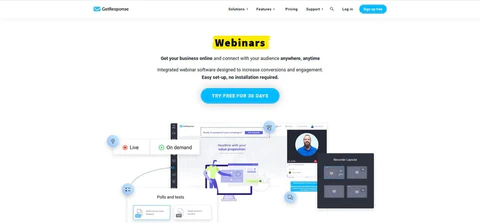
GetResponse is one of the webinar software platforms that have seen steady growth in popularity over the past few years. It offers huge features like email follow up and mass email messaging. These features make it easier for businesses to keep their customers engaged and help them communicate more effectively. This company also provides apps for both iOS and Android operating systems.
5. EverWebinar
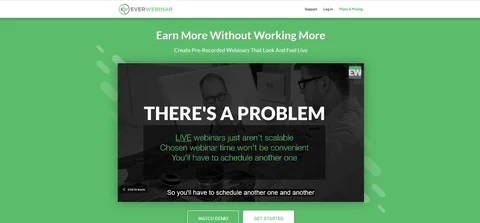
One company that is proving successful in the industry is EverWebinar. This software platform has been a pioneer in the webinar industry. The company has taken many steps to create an efficient system for businesses to use when hosting a webinar. To accommodate their customers, the company offers features such as video recording and replay, webinar creation wizard, webinars for any device or browser, and real-time collaboration. The best webinar software platforms of 2023 are EverWebinar, Vyew, Eventbrite, and Zoom. Each company offers unique features to their users including EverWebinar’s experience-based tracking of people’s page views as well as its assisted messaging system.
6. EasyWebinar
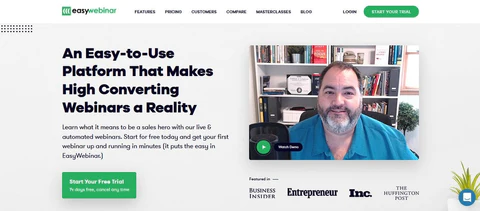
EasyWebinar is an online webinar platform. With this software, webinar developers can design and create webinars that are easy to set up and run without any technical difficulties. It comes with a variety of features that allow users to plan and manage their webinars easily. One feature that sets it apart is the ability to host live chats during the webinar which allows people in different locations to communicate easily with each other while they watch. EasyWebinar is a software platform that enables people to create and manage webinars for their organization. The platform makes it easy to use with a web-based interface. It also has a built-in autoresponder system so that attendees can be notified about the upcoming webinar and how to register for it.
7. GoToWebinar
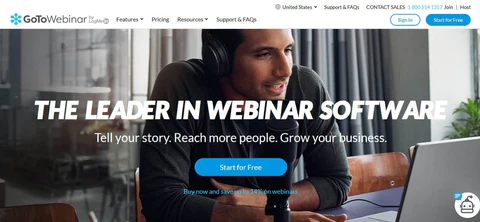
GoToWebinar has a significant number of features that makes it the most flexible and powerful webinar software platform on the market. The interface is very user-friendly, meaning that you won’t need to waste time creating complicated sign-up forms. It also has a wide variety of integrations with other platforms and systems like WordPress, Shopify, MailChimp, and more. GoToWebinar is a webinar software platform that provides event administrators and participants with the tools needed to communicate online. The company offers a flexible pricing plan, as well as a 14-day free trial. They also offer full support for one-on-one calls and meetings through their conferencing features. With GoToWebinar, you can choose from several different payment plans, depending on your budget.
8. WebinarNinja
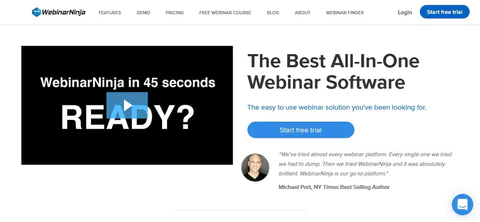
WebinarNinja is one of the leading software platforms for webinars. It has an easy-to-use interface that enables users to create their own professional presentations and start recording them easily. The platform features a live chat system that allows participants to ask questions and interact with other members during a webinar. WebinarNinja is a software platform that uses native web technologies. It’s mobile first, cloud-based, and offers a range of features that attract businesses. Some of these features include surveys, polls, and quizzes to make online events more interactive. The product also has integrations with social media platforms like Facebook and Twitter.
Conclusion
The conclusion of the research is that there are many different types of webinar software platforms on the market. Some platforms offer free and others charge a monthly fee. It’s important to consider what your specific needs are before purchasing from a platform specifically.


Great blog you have here.. It’s difficult to find high quality writing like yours nowadays.
I seriously appreciate individuals like you! Take care!!